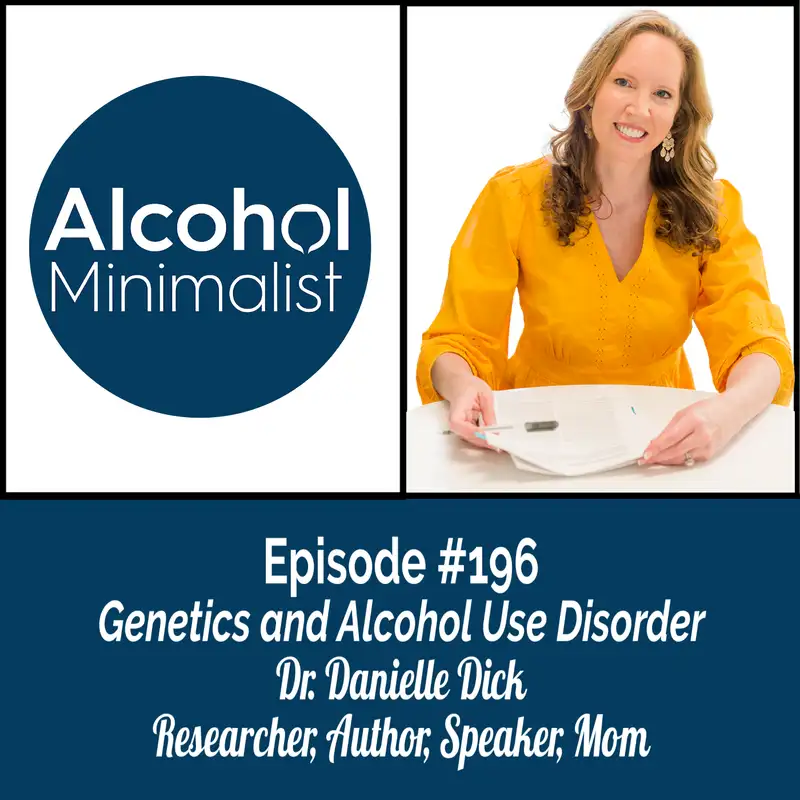Genetics and Alcohol Use Disorder with Dr. Danielle Dick
This week on the show, I'm thrilled to share a conversation with Dr. Danielle Dick, the Director of Rutgers University's Rutgers Addiction Research Center. Danielle brings a wealth of experience in science and study of genetics to share how our genes and our environments influence our lives.
Danielle Dick, Ph.D. is a Professor of Psychology and Genetics and author of THE CHILD CODE. She is an internationally recognized and award-winning expert on genetic and environmental influences on human behavior. She has led and contributed to more than 25 grants from the National Institutes of Health, with grant funding totaling >55 million dollars. She has >425 peer-reviewed publications in the areas of child development, addiction, mental health, genetics, and human behavior, and has won numerous national and international awards for her work. She has been named one of the most highly cited researchers in the world.
Danielle Dick, Ph.D. is a Professor of Psychology and Genetics and author of THE CHILD CODE. She is an internationally recognized and award-winning expert on genetic and environmental influences on human behavior. She has led and contributed to more than 25 grants from the National Institutes of Health, with grant funding totaling >55 million dollars. She has >425 peer-reviewed publications in the areas of child development, addiction, mental health, genetics, and human behavior, and has won numerous national and international awards for her work. She has been named one of the most highly cited researchers in the world.
You may also like to check out her website for areas of research and links to articles that may be of interest: https://www.danielledick.com/
Resource for addiction risk: https://www.addictionrisk.com
Links to all the Sober October Series:
Episode 144: Buffering with Alcohol
Episode 146: Reluctance and Resistance to Change Your Drinking
Episode 147: Using Curiosity to Change Your Drinking
Check out Drink-Less Success to further your efforts for More Sober October!
New to the podcast? Download the Podcast Listening Guide.
Want to schedule a call to talk about how I work with people? Click here for a FREE call.
Join my private FB group Alcohol Minimalists here: https://www.facebook.com/groups/changeyouralcoholhabit
Resource for addiction risk: https://www.addictionrisk.com
Links to all the Sober October Series:
Episode 144: Buffering with Alcohol
Episode 146: Reluctance and Resistance to Change Your Drinking
Episode 147: Using Curiosity to Change Your Drinking
Check out Drink-Less Success to further your efforts for More Sober October!
New to the podcast? Download the Podcast Listening Guide.
Want to schedule a call to talk about how I work with people? Click here for a FREE call.
Join my private FB group Alcohol Minimalists here: https://www.facebook.com/groups/changeyouralcoholhabit
Has this podcast helped you? Please leave a review.
Follow me on Facebook & Instagram: @AlcoholMinimalist
Low risk drinking guidelines from the NIAAA:
Healthy men under 65:
No more than 4 drinks in one day and no more than 14 drinks per week.
Healthy women (all ages) and healthy men 65 and older:
No more than 3 drinks in one day and no more than 7 drinks per week.
No more than 3 drinks in one day and no more than 7 drinks per week.
One drink is defined as 12 ounces of beer, 5 ounces of wine, or 1.5 ounces of 80-proof liquor. So remember that a mixed drink or full glass of wine are probably more than one drink.
Abstinence from alcohol
Abstinence from alcohol is the best choice for people who take medication(s) that interact with alcohol, have health conditions that could be exacerbated by alcohol (e.g. liver disease), are pregnant or may become pregnant or have had a problem with alcohol or another substance in the past.
Abstinence from alcohol is the best choice for people who take medication(s) that interact with alcohol, have health conditions that could be exacerbated by alcohol (e.g. liver disease), are pregnant or may become pregnant or have had a problem with alcohol or another substance in the past.
Benefits of “low-risk” drinking
Following these guidelines reduces the risk of health problems such as cancer, liver disease, reduced immunity, ulcers, sleep problems, complications of existing conditions, and more. It also reduces the risk of depression, social problems, and difficulties at school or work.
Following these guidelines reduces the risk of health problems such as cancer, liver disease, reduced immunity, ulcers, sleep problems, complications of existing conditions, and more. It also reduces the risk of depression, social problems, and difficulties at school or work.
Creators and Guests

